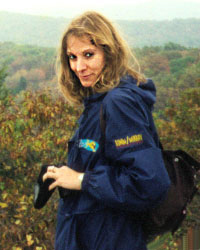|
|
The first day that I ever worked
for Ken Burns, I sliced my index finger on a runaway
metal film reel. The gash was deep; it wouldn't stop bleeding. I ran
down the hall of the NY post production house to the modest kitchen
and dangled the gushing appendix under cold water. I stood there, embarrassed
as all get up, trying to figure out what to do without letting on that
Florentine Film's latest employee had just made a really stupid move.
It was 1987 and I was the new assistant on Ken's
almost finished documentary, The Congress. The
previous assistant had left and I was the new recruit to see the project
through to the end. It was crunch time. In the corner editing room,
his film Thomas Hart Benton was just shy of
completion. In three other rooms Ken's editors
were half-way through his unprecedented Civil War
series.
Everyone was busy. I tried to wrap the finger in a cold paper towel
and held it up in the air while hanging my head between my knees so
I wouldn't faint from the sight of so much of my own blood. Suddenly
someone lightly touched my back and a gentle voice said, “Are you
okay, do you want us to take you to the hospital?” I slowly turned
my head and there was Ken Burns, my new employer,
sitting on a chair next to me. He had interrupted a screening to see
if I, a lowly stranger to his team, was okay. Over the past 13 years
that I have worked and played with Ken Burns,
he has always maintained that attention and care to both his films and
to those around him.
Shortly after The Congress was completed in 1988,
I began the process of graduating from assistant editor to editor; honing
my skills on low budget feature films and small documentaries in and
around New York City.
Then, in the fall of 1990, Ken Burns called again
to see if I would be willing to come live in Walpole, New Hampshire
for a few months to be Paul Barnes' Associate
Editor on Ken's upcoming film about the history
of radio, Empire of the Air. I tried it; I
liked it, so did Paul. The experiment of cutting
and living at the Florentine Films compound out in the countryside was
a success. In the fall of 1992, I extracted myself from New York and
signed on with Ken for another two and half years
as one of his three editors on the epic series Baseball.
I am sure that there will never be a finer post production team than
the one we had to edit that series! That crew worked together, played
together, slept well, it was a unique work experience; it was Camp
Florentine!
When Baseball was completed most of the team disbanded.
I decided to go west. I moved to Los Angeles in 1994 and haven't left
yet. (Though Ken tried, almost successfully, to
lure me back to work on Jazz.)
In my six years in LA I have edited documentaries, (such as National
Geographic's Volcano and Turner's Twin Stories); independent
features, (such as George Hickenlooper's, The Low Life); and
TV shows (such as MTV's Real World and HBO's A Little Curious).
In the fall of 1999, Ken
Burns stepped into my professional life again by introducing me to Steven
Spielberg. I produced and edited Spielberg's historical montage film,
The Unfinished Journey, for a televised New Years Eve 2000 event
in Washington DC. It was grand!
In the fall of 2000, I
am editing a documentary about the American writers in Paris in the
1920's, The Lost Generation, and gearing up for various proposed
film projects in the year 2001.
Still living in Santa Monica
with no immediate plans to move back to Walpole, New Hampshire... but
one never knows.
|
